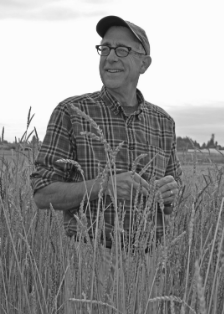2018
Stephen Jones
As wheat breeders go, Stephen Jones is something of a rock star. The director of The Bread Lab at Washington State University (WSU) has been profiled in such popular publications as The Atlantic, The New York Times, New York Magazine, and Wired Magazine. He has spoken at the Aspen Ideas Festival, received the 2017 Angelo Pellegrini Award for culinary contributions, was named the Clif Bar & King Arthur Flour Endowed Chair in Organic Grain Breeding & Innovation, and counts among his friends some of the world’s best chefs, bakers, brewers, and philanthropists. The College of Agriculture’s 2018 Distinguished Alumnus traces the roots of his notable and innovative career back to Chico State.
“I grew my first wheat crop on five acres of the Chico State Farm in 1977,” Jones recalls. “It’s where I learned how to plant, irrigate, and combine a wheat crop, and I grew to love the beauty and simplicity of wheat. I became haunted by it.”
While at Chico State, Jones found a mentor in Professor Marian Baldy, a UC Davis-trained geneticist who introduced Jones to the world of genetics.
“Marian Baldy was amazing. Aside from counting chromosomes, which I learned in graduate school, everything I learned about genetics was based on what I learned from her,” Jones said. “Throughout my collegiate career, from community college through my PhD program, she was the only female professor I had. She is an intellectual force in my life.”
Jones graduated with a bachelor’s degree in agronomy in 1980, and after spending time abroad, he returned to graduate school at UC Davis, where he earned both his master’s degree in agronomy and PhD in genetics. In 1991 he was hired as a wheat breeder at the Washington State University (WSU) main campus in Pullman. For the next 17 years, Jones would breed wheat for the commodity market qualities of yield and disease resistance. But the lifelong baker and food lover believed that wheat could be so much more interesting than the uniform white flour found on most supermarket shelves.
“One hundred years ago this country lost 25,000 flour mills in about a generation. Today there are fewer than 200 flour mills in this country,” Jones told students in a seminar on the Chico State campus in March. “What that means is that 25,000 communities lost something in their food supply. They lost the unique flavors, nutrition, and terroir that each of those communities was able to produce.”
In 2008, Jones moved to Western Washington’s Skagit Valley to run WSU’s Mount Vernon Research Center. In a county where the USDA registers no wheat production, he was intrigued to find growers of many of the county’s 80 different crops using wheat in their crop rotations to break the cycles of pest and disease, albeit often at an economic loss. Jones saw an opportunity, and so he created The Bread Lab to help growers capture more value in the wheat they were already growing.
“We breed non-commodity wheat, barley, buckwheat, rye, and other grains. By non-commodity, I mean that we’re able to define them as a community—as craft bakers, millers, maltsters, brewers, distillers, chefs, community members, serious home bakers, not serious home bakers, whatever. We can define what our food looks like because we are out of the commodity system. We don’t allow the price of the crop that’s grown in my region to be determined in Kansas City, Chicago, or Minneapolis,” Jones explained.
The Bread Lab occupies 12,000 square feet at the Port of Skagit and includes a craft bakery, professional kitchen, milling laboratory, cytology lab, and the King Arthur Flour Baking School at The Bread Lab. Each year, Jones and his graduate students grow thousands of types of wheat in search of improved flavor profiles, nutrition, and functionality. With 123 partners in The Bread Lab, including Patagonia, Clif Bar, King Arthur Flour, and New York City Schools, Jones and his colleagues focus on the farmers first to develop varieties that offer high yields with fewer inputs. Then they figure out the best use for that grain.
“We work with some of the best bakers and chefs in the world, and we believe that is novel,” Jones said. “We as breeders can find the right wheat, and then we hand it off to bakers and chefs who can make it acceptable and delicious to us and to other people around the world.”
Between developing new varieties of wheat, teaching and mentoring graduate students, running The Bread Lab, and traveling and speaking frequently throughout the country, Jones knows something about the value of time, and yet he still takes the time to bake a loaf of bread nearly every day.
“We’ve removed time as an ingredient in our diets, and we need to get it back,” he told students during his visit to campus to accept the 2018 Distinguished Alumni Award.
He also advised, “Wake up earlier and show up early to everything, including sunrises. It is not easy, that’s the point. Read outside of your interests. It will help you expand your interests. And I wish I had known earlier in my life that it would all turn out okay.”

